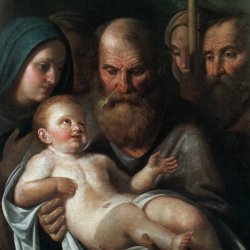
This is the first in a series of devotions based around the events of Holy Week. Read the intro to the series here.
- Scripture -
Holy Monday is the first day of Holy Week. It is traditionally marked by reading this passage of scripture.
The next day as they were leaving Bethany, Jesus was hungry. Seeing in the distance a fig tree in leaf, he went to find out if it had any fruit. When he reached it, he found nothing but leaves, because it was not the season for figs. Then he said to the tree, “May no one ever eat fruit from you again.” And his disciples heard him say it.
On reaching Jerusalem, Jesus entered the temple courts and began driving out those who were buying and selling there. He overturned the tables of the money changers and the benches of those selling doves, and would not allow anyone to carry merchandise through the temple courts. And as he taught them, he said, “Is it not written: ‘My house will be called a house of prayer for all nations’? But you have made it ‘a den of robbers.
When evening came, Jesus and his disciples went out of the city. In the morning, as they went along, they saw the fig tree withered from the roots. Peter remembered and said to Jesus, “Rabbi, look! The fig tree you cursed has withered!”
Mark 11:12-17, 19-21
- Reflection -
Many of us are familiar with the story of Jesus clearing the temple. Its common to use it as a challenge to whether our churches and Christianity as a whole has sold out to commercialism. But the cursing of the fig tree is a bit more bizarre. What was going on here? Why was Jesus so frustrated. Poor fig tree - its not its fault it wasn’t in season… right?
These two stories are actually intimately related to one another. By placing the two parts of the fig tree story around the clearing of the temple, Mark is telling us that the temple story actually provides the meaning of what was going on with that ‘poor’ fig tree.
The tree represents Judaism as it was then. It’s season has come to an end. And it isn’t baring fruit. When Jesus gets to the temple he sees why. But its not the reason you might think. The reason the temple is no longer yielding fruit is their religious services have become barriers to people encountering God. We often interpret the money changers as opportunists, commercialising the temple. We assume Jesus is angry because they’re selling things in a holy place. But what if we saw them in a different light. What if people had started selling doves as a well-meaning service for pilgrims who had come to make sacrifices. What if the tables had first been put up as a legitimate attempt to help people with their faith, but over time had ended up as an institution, a sideshow detracting from the temple’s original purpose: to be a place where anybody could come and meet with God. The Fig tree suggests that Jesus was angry because these services, this way of running the Temple, was no longer bearing fruit.
I’m challenged to question how I run things. How do I lead ministry? What well meaning services have I established out of a desire to support students in their faith, but which are no longer bearing fruit. Am I guilty of running religious institutions that have become more focussed on their own sustainability than with their original purposes: to help people encounter God? If Jesus walked into my student gathering would he want to sit down and join in, or start protestingly trashing the furniture?
- Prayer -
Jesus, save me from my own propensity for religiosity. Keep me from falling out of season. Help me and my ministry remain focussed on what matters most, feeding those who are hungry; helping people meet with you. Thank you for making my body your temple. May people encounter you through me. Rid me of anything that might create barriers so that I can bear good fruit for you and your Kingdom.
Photo Credit: Paul Morris






